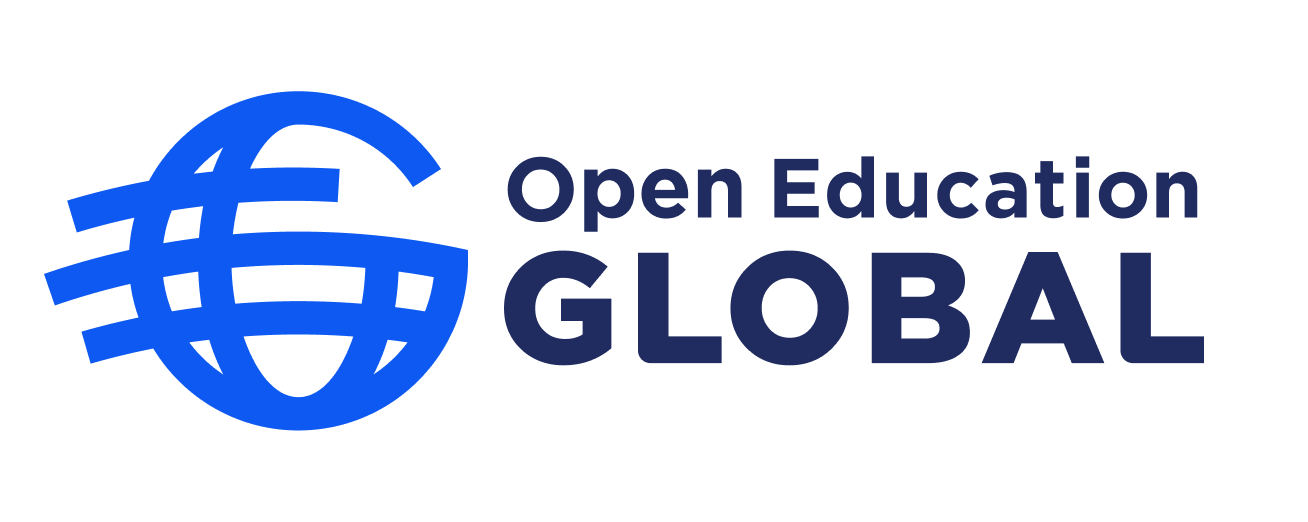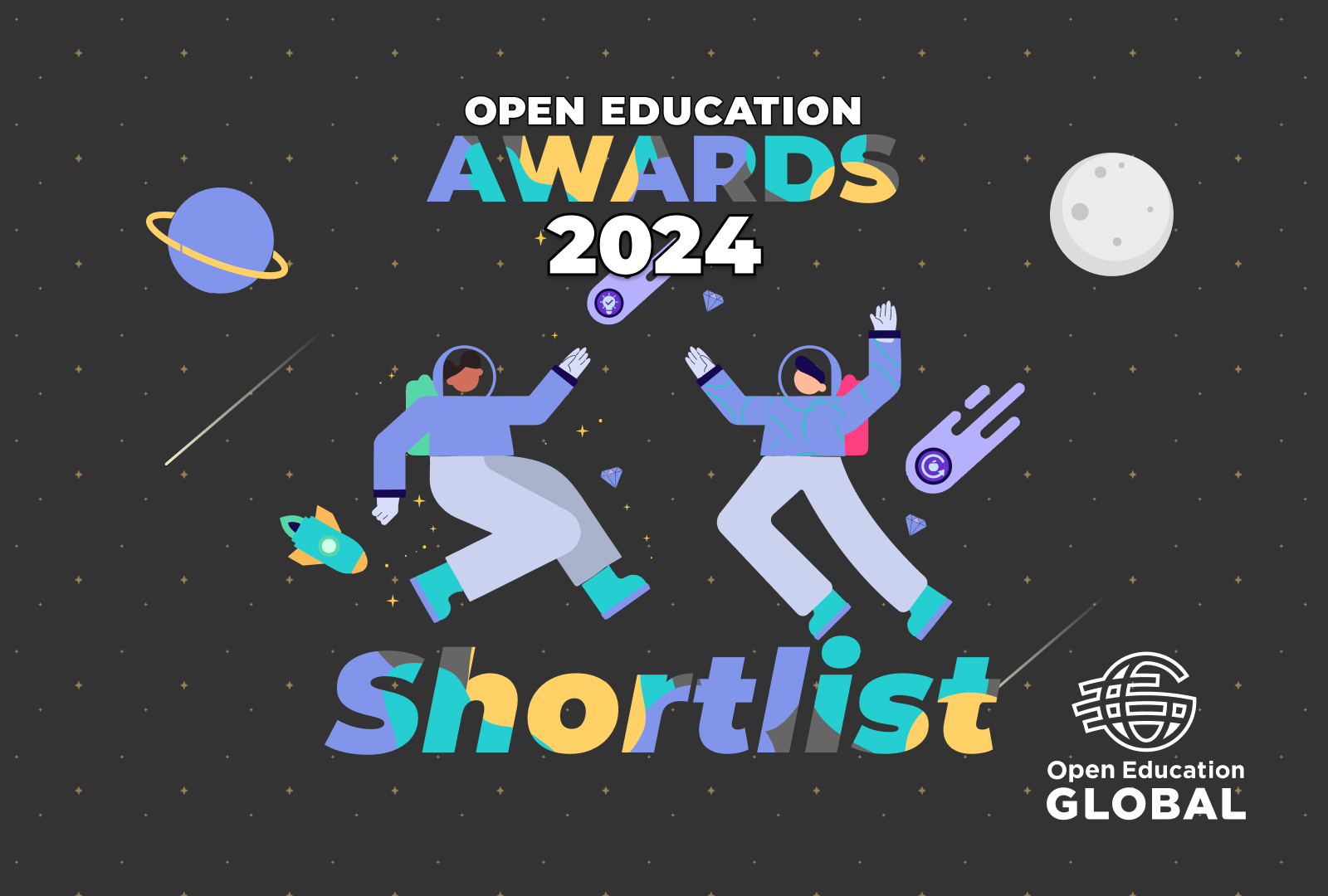Once again the Open Education Awards for Excellence provides recognition for the people, resources, and practices in Open Education through its community-driven process. After the process of open nominations in May and our committee review we are excited to share now a not so short list of finalists for the 2024 Awards.
Like last year, we do this to build more excitement for the final award announcements, but more importantly to ensure we are recognizing a wider range of open education efforts. This is the next step in adding more entries to the Hall of Fame more than 200 awardees recognized since 2011.
This began with a collection of 112 nominations across 16 award categories, representing people and projects from 28 countries. Next, the work of our review committee, which includes 30 former award winners combined with the input of the OEGlobal Board of Directors, gets us to this current stage.
This year’s nominees showed highest numbers of nominations in categories such as Significant Impact OER, Open Collaboration, Equity Diversity and Inclusion, and the new special category for AI and Open Education.
In agreement with comments from our reviewers, I am deeply impressed how the OEAwards continues to surface and highlight people and projects in great detail. This process truly demonstrates globally the continuing innovation in and commitment to the ideals of open education. I hope it is as obvious to you that the Awards are less of a competition and more of a broad act of recognition in our field.
Alan Levine, OEAwards Program Manager
That’s enough introduction, it’s time to meet the finalists for the 2024 OEAwards named below. For more details and links, please see the 2024 OEAwards Finalists gallery.
PEOPLE IN OPEN (Individual Awards)
Catalyst Award
This award is presented to an individual actively engaged in promoting the creation and implementation of OER and application Open Practices. A Catalyst is someone other than a professor/teacher who supports the ideals of the Open Education movement through their own practices and who creates engagement in Openness within an organization or community.
- Kimberlee Carter, Conestoga College
- Melody Chin, Singapore Management University
- Jonathan Poritz, Independent
- Joy Shoemate, Kim Grewe, and Maritez Apigo, Open for Antiracism project
Educator Award
This award honors an innovative teacher/professor who has published and/or used a significant body of Open Resources and/or applied Open Practices over a sustained period (at least one year) in their teaching practice. This individual’s open course materials and professional practices have been recognized for impacting student learning and influencing peers to share more openly.
- Kiranjot Kaur, Conestoga College
- Ulrich Kaiser, Hochschule für Musik und Theater München
- Fatih Yegul, Conestoga College
- Maria Luisa Zorrilla, Universidad Autonoma del Estado de Morelos
Student Award
This award recognizes the outstanding endeavors of a student who has advocated for or benefitted academically from using open educational resources or open educational practices. It is presented to a student whose achievements may inspire others to pursue degree programs that utilize open resources and/or someone who played a prominent role in advocating successfully for the promotion and advancement of open education.
- Carleigh Charlton, Brock University
- Mollie Schnurr, Trent University
Leadership Award
This award is presented to an individual who has demonstrated significant leadership and longstanding involvement with Open Education. This person has made significant and clear contributions to the furtherance of the Open Education movement, with contributions to Open Education that have spanned regions and/or had a global impact.
- Laura Czerniewicz, University of Capetown
- James Glapa-Grossklag, College of the Canyons
- Colin de la Higuera, Nantes Université
- Adrian Stagg, University of Southern Queensland
WHAT WE SHARE (Open Asset Awards)
Open Curation / Repository Award
This award is given to an exceptional collection of high-quality open materials made available via a process of curation or review. More than merely collecting content on a specific subject, strong curation involves carefully selecting content. evaluating it for specific purposes, and making it available in a meaningful way that can then be customized and re-shared for other people..
- 101 Creative Ideas to Use AI in Education. A Crowdsourced Collection
- Australasian OEP Digest
- EduAR
- MAICC (Open Network of Citizen Science Projects / Malla Abierta de Iniciativas de Ciencia Ciudadana)
Open Infrastructure Award
This award is for implementing or developing a set of technologies that encompass open-source tools for creating open educational resources, use in an educational context, curation, improvement, and reuse, as well as sharing. The “infrastructure” is broader than open-source software; it also includes open hardware, open standards enabling interoperability, and other open technologies that are instrumental in enabling open education.
- Docsify-This
- Open Music Academy
Open Reuse / Remix / Adaptation Award
This award is given to an exceptional collection of high-quality open materials made available via a process of curation or review. More than merely collecting content on a specific subject, robust curation involves carefully selecting content. evaluating it for specific purposes, and making it available in a meaningful way that can then be customized and re-shared for other people.
- Legal Research Skills: An Australian Law Guide (2023 and 2024 editions)
- The Fabulous Remixer Machine
Significant Impact OER Award
This award recognizes high-quality, innovative teaching and learning materials openly shared that have significantly impacted accessibility, distribution, remix, learning, or social change. These include but are not limited to Open Courses, Open Textbooks, Videos / Simulations / Animations, Audio / Audiobook, etc.
- Building a Medical Terminology Foundation
- Confident Supervisors: Creating Independent Researchers
- Frontiers for Young Minds
- Making Ripples: A Guidebook to Challenge Status Quo in OER Creation
- Once Upon an Online Time: Cybersecurity Issues recast through Classic Fairy Tales
- Semillas Elementary Spanish I
HOW WE SHARE (Open Practice Awards)
Open Collaboration Award
This award goes to an environment that fosters the collective production of open resources and open practices with a shared goal. Such places allow for an interchange of ideas supported through technologically mediated collaborative platforms, encourage new opportunities for people to form ties with others and create things together, and expand diverse goals, backgrounds, and cultures.
- All People Behind Higher Education for Good
- Australasian Open Educational Practices Special Interest Group
- Building together the future of education Innovation, Interdisciplinary Research and Open Science Bootcamp
- CAUL Open Educational Resources Collective
- fabriqueREL
- Open Access Teaching Case Journal
Open Pedagogy Award
This award highlights innovative open teaching practices that incorporate openness in multiple levels of the learning process. Open Pedagogy engages in the production, use, and reuse of content and demonstrates effective open teaching practices and ways of educating that increase access to learning and address equity and fairness.
- Alquimétricos Kit Cero
- NC State University Open Pedagogy Incubator
- WikiChallenge Ecoles d’Afrique / WikiChallenge African Schools
Open Research Award
This award recognizes research studies or initiatives about open education and/or related areas that help advance our understanding of and demonstrate effectiveness related to the challenges of the Open Education movement. Recognized efforts apply attributes of Openness in the research and dissemination processes.
- Call For Science
- SCOPE of Open Education: A New Framework for Research
SPECIAL AWARDS (Open Practice Awards)
Diversity, Equity & Inclusion Award
This award recognizes creativity, innovation, and the creation of opportunities that promote a welcoming and supportive diverse environment and facilitate inclusion and/or access. Examples are ones that develop cultural awareness and foster intercultural communication and collaboration.
- Doing the Work: Diversity, Equity, and Inclusion in Open Educational Resources and Equity-minded Open Course Design
- Equity, Diversity and Inclusion in Open Education project
- Heritages of Change: Curatorial Activism and First-Year Writing
- Open for Antiracism
Open With Artificial Intelligence Award
Artificial Intelligence (AI) presents both potential but a wide array of difficult challenges and policy implications for open education. Recognizing this rapid evolution, this award recognizes outstanding efforts to address through the lens of open education principles, concerns of policy, intellectual property, critical pedagogy, technical literacy as well as innovative and ethical use of AI in the creation and implementation of Open Educational Resources.
- AI and Open Education for All
- Guidelines for Using Generative AI in Open Educational Resources
- Knowledge Cartography for Young Thinkers Sustainability Issues, Mapping Techniques and AI Tools
- Open Audio – OER Audiobooks
Enacting SDG Award
This award recognizes exemplary leadership (individual or organizational) and application of open practices that not only align with specific examples of the seventeen United Nations Sustainable Development Goals (SDG) but have resulted in making a demonstrable difference in the world. As a new Special Award category, for inspiration, please see previous awards related to SDGs.
- Education in Emergencies (EiE) Package
Wildcard Award
Awards ought to be open themselves! This new award is open to recognizing something or someone not entirely covered by any other category. Create your own award criteria, and help recognize everything possible in open education.
- Editing Wikipedia as Academic Activism
- Fabrication Laboratory – Fab Lab Kä Träre
- Gettin’ Air With Terry Greene
- Open Educational Entrepreneurship – UNESCO Chair Open Educational Movement for LATAM 2023
Once again, the winners will be announced in an OEGlobal Live webcast on September 18. Be there live, save the date!
Learn about the finalists in more detail…
Share Your Comments in OEG Connect
What do you think of the shortlisted finalists? Add to the discussions below and share your experiences with the 2024 finalists.


It’s here! The Shortlist of finalists for the 2024 Open Education Awards for Excellence. We sent an earlier notice to the contacts and have gotten such wonderful responses.
Indeed make buzz here and beyond. Add your messages of congratulations here to any or all people and projects listed.
I’m of course deeply honored and (thanks for the opportunity to use this word!) gobsmacked to be in this company. Open ed folks are the best: none of y’all is going gently into that good night, but rather y’all are fighting the good fight every day to make the world a better place! It’s pretty inspiring… and also a lot of fun!
Congrats to all the people and projects honoured in this year’s OE Awards! Very humbled that my open source project Docsify-This is among them🙏🏼
Who hoo! This is very exciting! The work by each and everyone is indeed motivating! May the most deserving person win.
May the most deserving person win. 
Thank you so much for our selection as a Finalist for Significant Impact OER – my little team at Frontiers for Young Minds are all delighted and excited to receive this recognition! It’s amazing to be able to show our impact after 10 years, and to take a moment to celebrate what’s been achieved in that time.